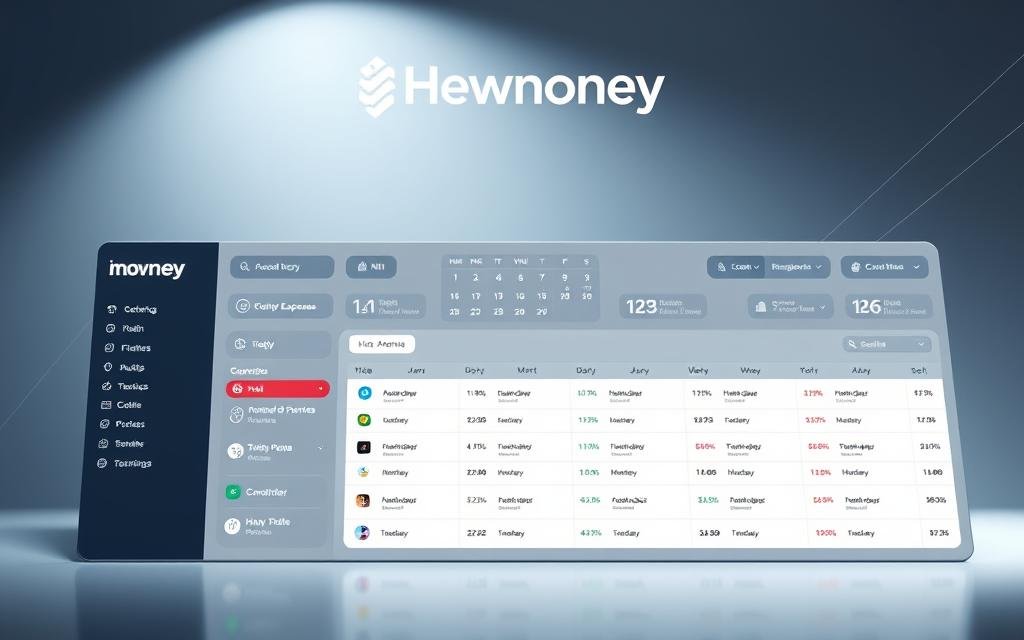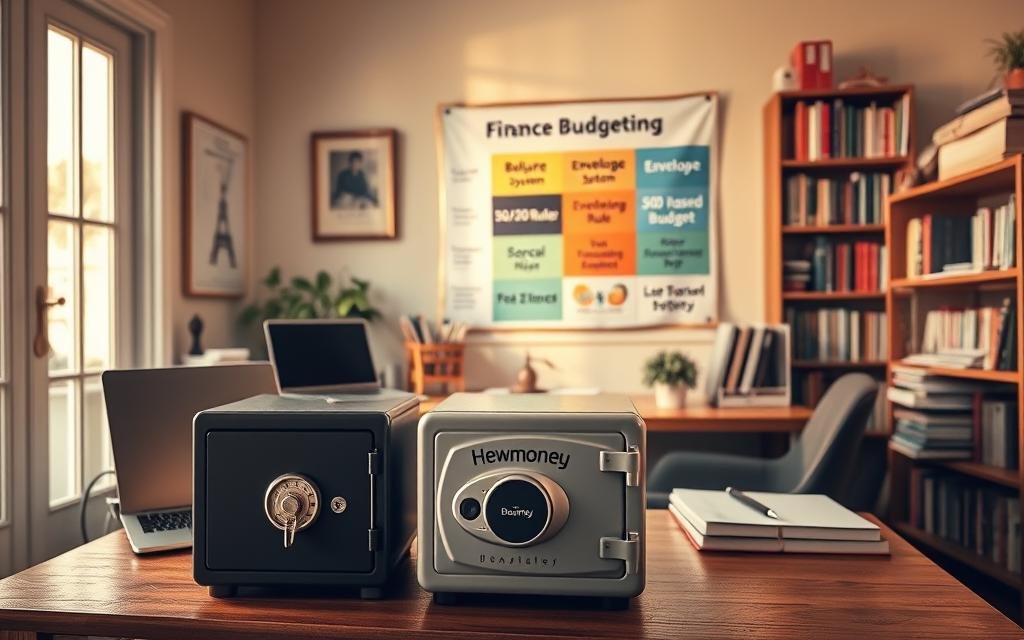Did you know that sticking to a budget can help you save 60% more? Managing money can seem tough, but a good budget plan can help. With an average monthly income of $4,000, knowing how to spend it is key.
The 50/30/20 rule is a great way to start. It suggests using 50% for needs, 30% for wants, and 20% for savings. This method keeps your finances stable, reduces stress, and boosts your financial health.
Creating a budget is more than just tracking money. It’s a plan for financial success. It helps you save for goals and avoid debt. We’ll explore how to prioritize spending and use modern tools for a secure future.
Key Takeaways
- Effective monthly budget planning aids in tracking expenses and managing finances.
- Allocating funds based on the 50/30/20 rule can enhance financial stability.
- Regular reviews of your budget lead to better awareness of spending habits.
- Utilizing budgeting apps can increase savings by 15%-20%.
- Setting clear financial goals can significantly improve the likelihood of saving successfully.
Understanding the Importance of Budgeting
Budgeting is key to financial stability. It helps people manage their money well. Sadly, 70% of Americans don’t have a budget, showing a big chance to get better at handling money.
Having a budget lets you control spending and pay bills on time. It’s a way to stay on top of your finances.
Those who budget are 30% more likely to meet their financial goals. Budgeting helps you find ways to save money and understand where it goes. It can save you up to $6,000 a year, which is a big plus.
Experts say saving 20% of your income is good for your finances. About 50% of people live paycheck to paycheck, showing the need for good budgeting. By budgeting well, you can greatly improve your financial health.
More and more people, including college students, use budgeting apps. These tools help track spending and cut down on unnecessary expenses. Being disciplined with your money is very important today.
| Budgeting Impact Statistics | Percentage |
|---|---|
| Americans without a written budget | 70% |
| Increased likelihood of reaching financial goals with a budget | 30% |
| Potential annual savings through budgeting | $6,000 |
| Americans living paycheck to paycheck | 50% |
| Students using budgeting tools | 40% |
| Reduction in discretionary spending through tracking | 20% |
By focusing on budgeting, you improve your financial management and set yourself up for success. Budgeting is not just about numbers; it brings peace of mind and financial strength.

What is a Monthly Budget?
A monthly budget is a detailed plan for how you spend your money each month. It shows how you use your income for different expenses and savings. The definition of monthly budget includes your net income, which is your earnings after taxes and deductions.
It lists both fixed and variable expenses. This helps you track your finances well.
Knowing how to budget is key to good financial health. It makes your financial situation clear and helps you plan better. By looking at your income and expenses, you can decide how to spend your money wisely.

Budgeting helps you reach both short and long-term financial goals. It divides expenses into fixed and variable costs. Fixed costs, like mortgage and car payments, stay the same. Variable costs, like entertainment, can change.
| Expense Categories | Examples | Recommended Percentage of Income |
|---|---|---|
| Housing | Mortgage/Rent | 30% |
| Transportation | Car Payments, Gas, Maintenance | 15% |
| Food | Groceries, Dining Out | 10-15% |
| Utilities | Electricity, Water, Internet | 5-10% |
| Savings & Debt Repayment | Emergency Fund, Retirement | 20% |
| Entertainment | Movies, Subscriptions | 5-10% |
Creating a budget helps you manage your money better. Start by looking at your past spending. This helps you make smart choices and focus on what’s important.
Benefits of Monthly Budget Planning
Monthly budget planning brings many advantages of budget planning. It helps people take control of their finances. By knowing their income and expenses, they can find ways to save money.
One big plus is being able to plan for future costs. This helps avoid getting into debt.
Sticking to a budget builds financial discipline. It’s key for saving enough for emergencies. With the average American credit card debt at $6,000 in late 2022, budgeting is more important than ever.

A budget also reduces stress about money. Money worries can harm health, causing sleep issues and high blood pressure. By tracking spending, people often save $200 a month. This improves their financial health and overall well-being.
Also, talking about budgets with family improves money talks. It teaches kids about managing money. Families that set savings goals in their budgets are 50% more likely to reach them. Budgeting teaches responsibility and sets the stage for a secure financial future.
How to Create Your Monthly Budget
Creating a budget is key to financial health. Start by calculating your income to build a solid financial plan. Identify your regular income, like your salary, and ignore irregular income, like side jobs. This helps you understand your income better.
After knowing your income, track your spending to see where your money goes. This step is vital for a good budget.
Calculate Your Monthly Income
Your monthly income is the base of your budget. For example, if you earn $3,000 from two paychecks of $1,500 each, use this amount. Knowing your income helps you plan your expenses better.
Track Your Spending Patterns
Understanding where your money goes is essential. Spend a few months tracking your expenses to learn your spending habits. You can use receipts or budgeting apps for this.
About 80% of people notice their spending more after tracking. Knowing your fixed and variable expenses, like bills and groceries, helps set budget limits. For instance, if your expenses are $2,700, with $1,400 for rent and $400 for groceries, you can save more.

Good budgeting can improve your finances, with 80% of people saying it helps control money better. By tracking spending and analyzing patterns, you can change how you manage money.
Identify Your Financial Priorities
Knowing what’s important in your finances is key to a good budget. It’s important to separate must-haves like rent and food from wants like eating out or movies. This helps you spend on what really matters and reach your financial goals.
Studies show that budgeting can save 10%-25% more than not budgeting. It also reduces stress, as about 70% of adults feel more stressed without financial stability. By identifying priorities, you can make your budget work better. This means spending on needs first, then on wants, for a balanced life.
Setting clear financial goals is essential. Here’s a simple way to organize your priorities:
| Priority Type | Percentage of Budget | Examples |
|---|---|---|
| Essential Needs | 50%-60% | Housing, Groceries |
| Discretionary Spending | 20%-30% | Dining Out, Entertainment |
| Savings/Emergencies | 10%-20% | Emergency Fund, Retirement |
Checking your budget regularly helps keep it in line with your life and goals. By regularly reviewing your spending, you can make sure it matches your priorities. This not only improves your financial knowledge but can also boost your credit score, making it a smart move for your financial health.

Design Your Monthly Budget
Creating a budget is key to financial success. It means setting up specific categories for how you’ll spend your money each month. Knowing these expense categories helps you make smart spending choices. By focusing on saving first, you can boost your savings and understand your monthly income better.
Common Expense Categories
It’s important to divide your expenses into easy-to-manage categories. Here are some common ones:
- Housing: Mortgage or rent, averaging about $1,200 per month in the U.S.
- Utilities: Electricity, gas, water—use past bills to estimate costs.
- Transportation: Costs like gas, about $3.50 per gallon nationally.
- Groceries: Average monthly spending is $300 for individuals and $1,000 for families.
- Entertainment: Includes dining out, streaming, and leisure, costing $100 to $250 monthly.
- Education: Monthly tuition for students at in-state public colleges is around $833.
- Personal care: Costs for hygiene and grooming, about $40 monthly.
- Savings: Contributions to an emergency fund or investments should be prioritized at the start of the month.
Pay Yourself First
The ‘pay yourself first’ principle is essential for financial health. By setting aside money for savings before other expenses, you can grow your savings over time. For example:
| Savings Breakdown | Amount |
|---|---|
| Emergency Fund | $300 |
| Vacation Fund | $200 |
| Retirement Contribution | $200 |
| Total Savings | $700 |
This approach helps meet long-term goals and builds financial stability. By following a structured budget, you can stay on track and avoid overspending.

Common Budgeting Methods
Learning about different budgeting methods can really help you manage your money better. Each method has its own way of dividing up your money based on what you need and want. The 50/30/20 rule and zero-based budgeting are two popular ways to organize your finances.
50/30/20 Rule
The 50/30/20 rule is easy to follow. It splits your after-tax income into three parts:
- 50% for needs (like rent and food)
- 30% for wants (fun stuff)
- 20% for savings (for retirement and emergencies)
This method makes budgeting simple. It helps you see how you spend your money. Many people want to save more, making the 50/30/20 rule a good choice for saving.
Zero-Based Budgeting
Zero-based budgeting means you use every dollar of your income for something specific. This way, your budget adds up to zero at the end of the month. It helps you track your spending and plan your finances better.
| Expense Category | Amount ($) |
|---|---|
| Rent | 2,000 |
| Groceries | 500 |
| Bills | 100 |
| Insurance | 250 |
| Gas | 400 |
| Credit Cards | 250 |
| Student Loan | 400 |
| Entertainment | 250 |
| Clothing | 400 |
| Retirement Fund | 200 |
| Vacation Fund | 100 |
| Emergency Fund | 150 |
Zero-based budgeting makes sure you use all your income. It helps you understand where your money goes. Trying out these budgeting methods can improve your financial habits and help you reach your money goals.

Utilizing Budgeting Tools and Apps
Budgeting apps and financial tools are key in today’s money management. They help users automate budgeting tasks, like tracking expenses and setting savings goals. Apps like Mint, YNAB (You Need A Budget), and EveryDollar let users link accounts for real-time tracking and spending categorization.
Using these apps can change how we manage money. A survey showed 70% of users became more financially aware after using them. Over 50% found it easier to stick to budgets than with spreadsheets. By linking bank accounts, apps can track about 85% of transactions automatically.

YNAB users stand out for their savings. They save $600 by their second month and $6,000 in a year. This success comes from setting smart financial goals. Users who set goals in the app achieve them 50% more than those who don’t.
App prices vary a lot. YNAB costs $14.99 a month or $109 a year. Monarch Money charges $14.99 monthly or $99.99 yearly. Acorns starts at $3 a month, fitting different financial needs.
Budgeting tools offer personalized financial education. Users can find resources to boost their financial knowledge, with some seeing a 30% increase. Almost 75% of users feel more in control of their finances after using these apps regularly.
Expense Tracking Strategies
Tracking expenses is key to managing your budget well. There are two main ways to do this: manual tracking and using digital tools. Each method helps you understand your spending habits better.
Manual vs. Digital Tracking
Manual tracking means writing down your expenses in a notebook or spreadsheet. It helps you connect with your spending but can take a lot of time. Digital budgeting tools, on the other hand, offer quick updates linked to your bank accounts. They make tracking easier and keep you updated without extra work.
Choosing the Right Budgeting App
Picking the right budgeting app is important for easy expense tracking. Consider these factors:
- Data Security: Keep your personal info safe.
- Cloud Backup: Access your data anytime, anywhere.
- Cross-Platform Functionality: Use it on all your devices.
- Collaborative Data Entry: Share data with family or partners.
- Bank Integration: Sync with your bank for up-to-date info.
- User-Friendly Design: Easy to use and understand.
Popular apps include Acorns, Goodbudget, Mint, and more. It’s good to check your budget regularly. Try to review it weekly to keep your finances in order.
![]()
Choosing a method to track expenses is important. It helps you stay within your budget. By understanding your spending, you can follow the 50/30/20 rule for a balanced financial life.
Budget Management Tips
Effective budget management needs financial discipline and regular checks. Following budget tips can help you get out of debt and reach savings goals.
Setting realistic financial goals is key. Make SMART (Specific, Measurable, Attainable, Relevant, Timely) goals for better success. For example, aim to save $1,000 by a certain date. The 50/20/30 rule can also guide your budget by allocating 50% for essentials, 20% for savings or debt, and 30% for non-essentials.
Keeping a low credit utilization is important. Aim to use less than 30% of your credit limit to improve your score. Experts suggest having an emergency fund of three to six months’ expenses. This fund helps with unexpected costs.
For big purchases, divide the cost by the days until you buy it. For example, to save $1,500 in 300 days, set aside $5 daily. Having no-spend days once a week helps stay within budget.
Using cash for variable expenses, like groceries, helps stick to a budget. A cash-only budget makes tracking spending easier and prevents overspending. Automatic payments also help, but you need to watch your cash flow.
| Tip | Description |
|---|---|
| Set SMART Goals | Make financial targets specific and realistic to achieve. |
| Use the 50/20/30 Rule | Allocate income to specific categories: essentials, savings/debt, and leisure. |
| Maintain Emergency Fund | Save three to six months’ worth of expenses for unexpected costs. |
| Implement No-Spend Days | Choose one day a week to avoid unnecessary expenses. |
| Cash for Variable Expenses | Using cash for categories helps limit overspending. |
| Automatic Payments | Schedule recurring payments to avoid missing due dates. |
Regular budget talks with partners can improve money management strategies. It keeps everyone on track. Using these tips will help you achieve a more secure financial future.
Adjusting Your Budget Over Time
Budgets are key in financial planning, but they must be flexible. As life changes, so should your budget. Regular checks help spot the need for budget tweaks due to income shifts, new expenses, or goals.
For example, a pay raise or big purchases might mean it’s time to rethink your budget. Knowing how you spend money helps you use your funds better. This keeps your budget in line with your goals.
The following table shows common times to adjust your budget:
| Life Event | Recommended Adjustment | Potential Impact |
|---|---|---|
| Job Change | Update income and adjust expenses | More savings or spending on needs |
| Major Purchase | Reassess monthly budget categories | More savings for future goals |
| Debt Payoff | Redirect funds to savings or investments | Quicker financial freedom and growth |
Being adaptable is the heart of good budgeting. By updating your budget for life’s changes, you stay in control of your money. Regular reviews and knowing when to adjust your budget can greatly help your financial path.
Building an Emergency Fund
Creating an emergency fund is key to financial security and disaster preparedness. It helps cover sudden costs like medical bills or car repairs. Without it, 57% of Americans feel unready for financial emergencies.
Experts recommend saving enough for three to six months of living expenses. Yet, 50% of adults in the U.S. have less than three months saved. Also, 39% can’t handle a $400 surprise without borrowing or selling assets. Saving for emergencies can greatly reduce financial stress during unexpected times.
Setting a savings goal can boost your saving habits, with 63% agreeing. Automating savings from paychecks can improve consistency by 20%. This approach helps build a safety net against unexpected costs and avoids high-interest loans or credit cards.
For those with irregular income, flexible savings plans are vital. Financial planning must consider personal situations, like having dependents or being single-income. Prioritizing an emergency fund ensures better financial stability and readiness for life’s surprises.
Regularly Reviewing Your Budget
Regular budget reviews are key to keeping your finances in check. It’s best to do this once a month. This helps you track your spending and make changes as needed.
Not doing regular financial audits can lead to missed savings. For example, you might not notice you’re spending less on gas. This extra money can help with other important expenses.
It’s easy to overlook hidden costs, like unexpected medical bills. Spotting these can help you save money. For example, finding an extra $50 a month can save you $600 a year.
Knowing where your money goes is important. You might find you’re spending too much on dining out or home upgrades. This knowledge lets you make better financial choices.
In tight financial spots, reviewing your budget often is essential. It helps ensure you can pay your bills on time.
If budgeting feels like a chore, consider using automated systems. This can cut down on the time spent on budget reviews to every three months. Businesses that regularly review their budgets tend to meet their financial goals better.
Studies show that regular budget reviews can help spot errors quickly. This can improve profits, even when unexpected costs arise. Sticking to a regular review schedule helps you grow financially in the short and long term.
| Review Frequency | Potential Benefits | Time Investment |
|---|---|---|
| Monthly | Identify variances and improve savings | Approx. 2 hours after neglecting for 3-4 months |
| Every payday | Ensure accurate bill coverage and prevent mistakes | Shorten time with consistent reviews |
| Quarterly (automated) | Streamline process and focus on strategy | Reduce time spent by 30% with software |
| Monthly (businesses) | Monitor cash flow for timely adjustments | Consistent time reduction in management |
Conclusion
Effective monthly budget planning is key to financial empowerment. It helps individuals manage their finances well, whether they’re buying a home or starting a family. A good budgeting strategy improves financial literacy and spending habits.
Using budgeting tools and regularly reviewing financial plans can boost savings and investments. Recognizing the importance of insurance adds extra protection against surprises. Adjusting budgets for big life changes helps manage expenses like food and gas.
Starting to budget early sets a strong foundation for financial stability. Over time, budgeting becomes a tool for success, not a limitation. It leads to a more secure and fulfilling financial future.
FAQ
What is monthly budget planning?
Monthly budget planning is a way to manage your money. It helps you keep track of what you earn and spend. This way, you can control your finances and reach financial stability.
Why is budgeting important?
Budgeting is key because it lets you know what you owe and when to pay it. It also helps you save for the future. This improves your money handling skills.
How do I create a monthly budget?
First, figure out how much you make each month. Then, watch how you spend your money. Next, decide what’s most important to you. Lastly, make a plan for how to spend your money in different areas.
What are some benefits of monthly budget planning?
Monthly budget planning gives you control over your money. It reduces stress and helps you save more. It also prepares you for surprises, making your finances healthier.
What is the 50/30/20 rule?
The 50/30/20 rule is a simple budgeting method. It divides your after-tax income into three parts. 50% goes to needs, 30% to wants, and 20% to savings.
What budgeting tools can I use?
You can use tools like Mint, YNAB (You Need A Budget), and EveryDollar. These apps help track your spending and plan your finances. They make managing your money easier.
How do I track my expenses effectively?
You can track your spending by hand or with apps. Apps connect to your bank accounts for updates. Pick what works best for you.
What are some tips for effective budget management?
For good budget management, set achievable goals and adjust your budget as needed. Keep an emergency fund and automate savings. This helps reach your financial goals.
Why should I review my budget regularly?
Reviewing your budget keeps you on track with your financial goals. It also helps with life changes. This ensures your budget works well for you.
How can I build an emergency fund?
Build an emergency fund by saving three to six months’ worth of expenses. Set aside a small, steady amount from each paycheck. This will help cover unexpected costs.

